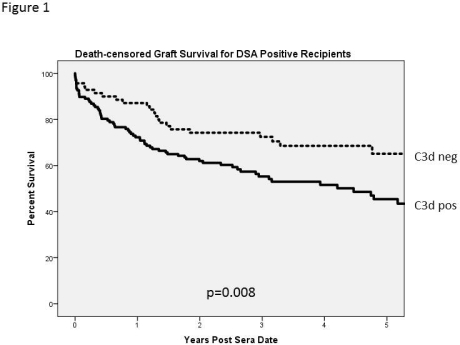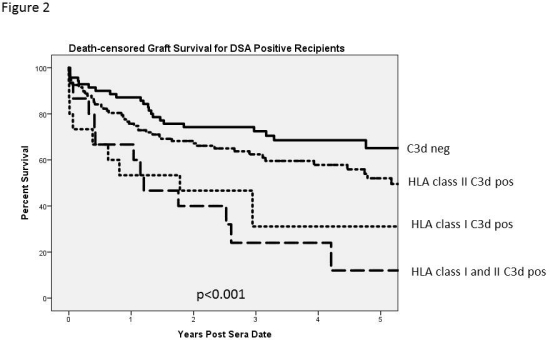Clinical Significance of C3d Binding Donor Specific Anti-HLA Antibodies (DSA) Detected by Single Antigen Beads (SAB) After Kidney Transplantation.
1Surgery/Transplant, The Ohio State University Wexner Medical Center, Columbus, OH
2Discovery Research, Immucor, Inc, Stamford, CT
3Tissue Typing Laboratory, The Ohio State University Wexner Medical Center, Columbus, OH
4Methodist Hospital, Houston, TX
5Nephrology, The Ohio State University Wexner Medical Center, Columbus, OH.
Meeting: 2016 American Transplant Congress
Abstract number: C5
Keywords: Alloantibodies, Graft survival, Kidney transplantation
Session Information
Session Name: Poster Session C: Antibody Mediated Rejection: Session #1
Session Type: Poster Session
Date: Monday, June 13, 2016
Session Time: 6:00pm-7:00pm
 Presentation Time: 6:00pm-7:00pm
Presentation Time: 6:00pm-7:00pm
Location: Halls C&D
A new Luminex-based SAB method detects DSA compliment fixing via C3d-binding. This study compares the clinical outcomes in kidney recipients that developed de novo DSA post-tx stratified by C3d binding by SAB assay (Lifecodes, Immucor). A cohort of 222 recipients tx'd between 6/2002 and 11/2013 with previously identified post-tx de novo DSA were retested by SAB C3d assay. This 222 patient cohort was 45.2 ± 12.1 (19-74) years old, 63% male (n=139), 35% African-American (n=77), 33% (n=73) sensitized pre-tx, and 11% (n=25) retx recipients. Median time to first rejection episode experienced by 112/222 (50.4%) recipients was 18.8 months (range 8 days to 6.6 years). Median time of sera testing was 35.8 months post-tx (range 8 days to 10 years). In 149/222 (67%) recipients the SAB C3d assay was positive. Analysis of anti-HLA class specificity revealed 72 (32.4%) of recipients were SAB C3d negative, 16 (7%) were anti-HLA class I only positive, 111 (50%) were anti-HLA class II only positive, and 23 (10%) were positive for anti-HLA class I and II. Death censored graft survival after the sera date was significantly worse for all SAB C3d positive vs C3d negative recipients. The difference in graft survival was most pronounced when anti-HLA class I SAB C3d binding was detected.
The difference in graft survival was most pronounced when anti-HLA class I SAB C3d binding was detected. We conclude that C3d binding in this SAB assay identifies de novo DSA kidney recipients at highest risk for graft loss.
We conclude that C3d binding in this SAB assay identifies de novo DSA kidney recipients at highest risk for graft loss.
CITATION INFORMATION: Pelletier R, Balazs I, Adams P, Steller P, DiPaola N, Rankin L, Diez A, Henry M. Clinical Significance of C3d Binding Donor Specific Anti-HLA Antibodies (DSA) Detected by Single Antigen Beads (SAB) After Kidney Transplantation. Am J Transplant. 2016;16 (suppl 3).
To cite this abstract in AMA style:
Pelletier R, Balazs I, Adams P, Steller P, DiPaola N, Rankin L, Diez A, Henry M. Clinical Significance of C3d Binding Donor Specific Anti-HLA Antibodies (DSA) Detected by Single Antigen Beads (SAB) After Kidney Transplantation. [abstract]. Am J Transplant. 2016; 16 (suppl 3). https://atcmeetingabstracts.com/abstract/clinical-significance-of-c3d-binding-donor-specific-anti-hla-antibodies-dsa-detected-by-single-antigen-beads-sab-after-kidney-transplantation/. Accessed July 3, 2025.« Back to 2016 American Transplant Congress
